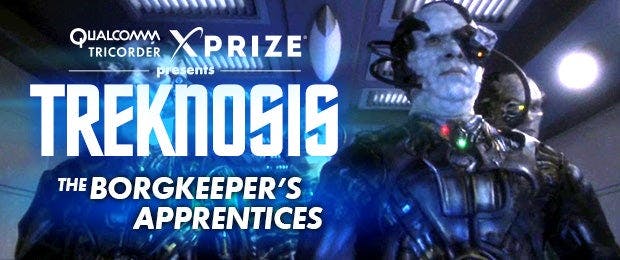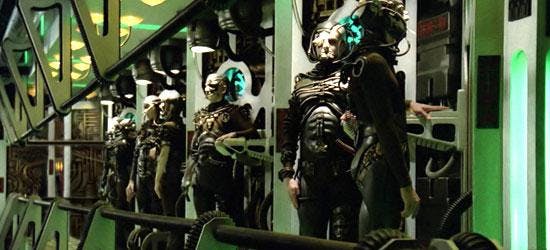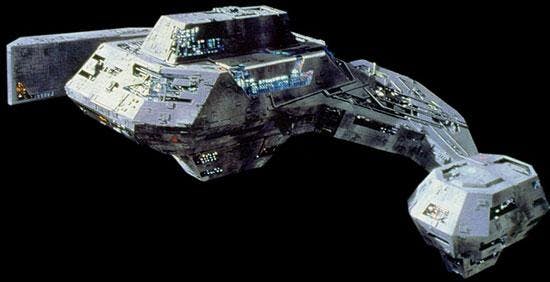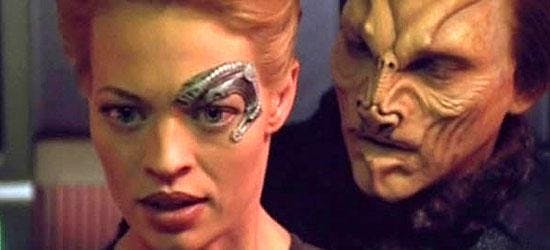Published Jun 30, 2014
TREKNOSIS: The Borgkeeper's Apprentices
TREKNOSIS: The Borgkeeper's Apprentices

Do bees have anything to teach us? Aside from the best way to remove stingers, or the importance of pollination? Annalee Newitz over at io9 thinks yes, with an editorial encouragingly titled, "This video of a honeybee swarm reveals why humans can't form consensus."
The video is an on-the-ground look at a swarm of bees in the process of deciding where to establish their next hive. Over the course of about half an hour, they do the traditional honeybee "here's where the flowers are" waggle dance at each other, indicating their proposed site for the new hive, until enough of them are doing the same dance – at which point they all start doing it.
Then they take off. Have a look at the first minute of the video and then skip to the last few. The departure is kind of stunning to witness, going from a giant ball of bees to a bare set of twigs in shockingly little time. Consensus is a beautiful thing.
The article goes on to talk about possible reasons why humans can't roll the way bees do, positing that it might have something to do with the fact that we're mammals who are all capable of breeding. Fascinating (cue eyebrow raise). But this makes me think, "What if we could do that? What might that look like?"

Seriously, though, think about it. It took those bees about half an hour to achieve consensus and act on it, and they're bees, with tiny bee brains. If you could wire a whole bunch of human minds together Borg-style, what might the benefits be?
Lots of people are getting some good use out of things like Quora and Reddit AMAs, harkening back to the glory days of Ask Metafilter. If we were all connected at the speed of thought, imagine how much quicker it would be to ask a question and get it answered, not just by one person but by hundreds. The sheer volume of replies might be overwhelming, but that might also make it easier to spot informational trends, weeding out the crackpot replies – building sort of an instant mental Wikipedia.
Imagine debating at the speed of thought, or even bypassing the need for debate altogether. Why waste time forming thoughts and lobbing them at your opponent when you can just see into their mind and get a sense of their position before they’ve even opened their mouth? What if we discover there are certain common truths held by all of us that render various eternally-debated questions inert for all time?
Having access to the minds of everyone else would also be incredibly handy. You could leverage the expertise of anyone and everyone at a moment's notice. Need to know how to pilot a helicopter, restart a nuclear reactor, or tame a wild boar? Someone in the hivemind knows how. Or what about distributed problem solving? Would it be possible to break a particularly difficult problem down and spread its parts among the hive for parallel processing? Just look at how handy that was for the Borg in the Star Trek: Voyager episode “Unity.” When Chakotay wakes to find former Borg, Riley Frazier, caring for him, he discovers a culture that is more human than Borg. With warring factions of severed Borg fighting amongst themselves, Chakotay learns how the collective can actually work to heal divisions to bring unity. Now that I think about it, they actually heal Chakotay with a neural link, too, and willingly destroy a Borg ship before it gains weapons capabilities. Maybe we can’t judge a Borg by its assimilation tubules.

What if being hive-linked meant we could do more than just see through someone else's eyes? Suppose we could assume control of another person's body remotely in the ultimate "Here, let me do that for you" move? Experts could move novice hands around to complete especially complex or difficult tasks, meaning any drone anywhere could be an accomplished vascular surgeon with zero training. This is something so outlandish-sounding that no Borg episode ever dealt with it, but the groundwork is being laid right now at the University of Washington, where one researcher moved another man's finger using a remote neural link. It's not surgery yet, but it's a start.
On the other hand, there'd be some downsides, too. Let's talk privacy concerns: I keep a lot of embarrassing memories in my own mind, safe behind the locked gate of my mouth, never to be spoken. Suppose hooking me into a hivemind opens everything in my mental vault up to everybody? No thank you!
Sure, being able to peer into someone else's thoughts would be theoretically super efficient for achieving understanding, but what about the thoughts of ten people? A hundred? Ten thousand? Is there a point at which you might no longer be able to distinguish between your own memories and those of another? If your memories are part of your personality, what does that do to your sense of self? Would you find it eroding gradually, or is it possible it might be obliterated overnight?
Let’s not forget Seven of Nine’s nervous breakdown into multiple personalities in another Voyager episode, “Infinite Regress,” shifting between all the species she'd helped to assimilate, from Klingon to Ferengi to the Vulcan High Command’s Subaltern Lorot, even a little girl named Mary. Leaving aside the obvious question about how much confusion and guilt played into her disorder, which personality is truly her own? Who is she? Where does she belong? Questions like these plagued Seven throughout her years aboard Voyager.

Looking into someone's thoughts and staring out into the world through their eyes might generate understanding, but is that the same thing as guaranteeing agreement? What happens if there are things we can't agree on? Remember the TNG two-parter, "Descent," and the ship that one gang of Borg ended up flying around in? The one that looked so weird, it wasn't even identifiable as Borg because they couldn't agree on what it should look like once they got disconnected from the hivemind? What if, once we're all linked together, we still retain our individuality to such an extent that it becomes counterproductive?

This led me to one last troubling thought: all of these downsides are things that might concern a civilization at the first stage of something like a Borg hivemind – that is, the first generation. Voyager had many things to teach us, but chief among them was Seven of Nine's character arc, highlighting the difficulties that come with separating someone from the collective who was assimilated into it from a very young age. What about the people who are born into it, who've literally never known anything else? Now multiply that across an entire population and calculate the likelihood of ever unbecoming a hivemind after about a century. With Seven, we watched her suffer through the agonizing loneliness that being severed from the hivemind brought.

As fun or terrifying as this is to think about, it thankfully remains pretty abstract for now, so there's no need for us to worry super hard about it…just yet. Would the bees worry about it if they could? Or are they too busy getting things done? Buzz.
source: io9
Jon Sung is a contributing writer for XPRIZE and copywriting gun-for-hire to startups and ventures all over the San Francisco Bay area. When not wrangling words for business or pleasure, he serves as the first officer of the USS Loma Prieta, the hardest-partying Star Trek fan club in San Francisco.
XPRIZE is an innovation engine. We design and operate prize competitions to address global crises and market failures, and incentivize teams around the world to solve them. Currently, we are operating numerous prizes, including the $30M Google Lunar XPRIZE, challenging privately funded teams to successfully land a robot on the Moon’s surface, and the $10M Qualcomm Tricorder XPRIZE, challenging teams around the world to create a portable, wireless, Star Trek-inspired medical device that allows you to monitor your health and medical conditions anywhere, anytime. The result? Radical innovation that will help us all live long and prosper.
Sign up today to join our mission, be a part of our campaign and win collectibles at: tricorderfederation.org.




